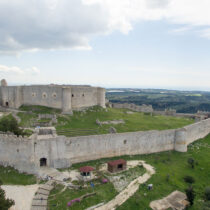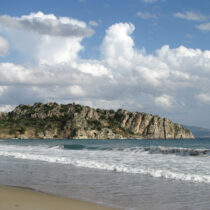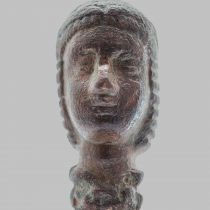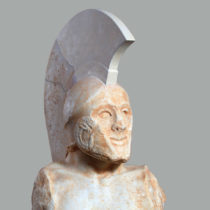Roman gladiators ate a mostly vegetarian diet
Roman gladiators ate a mostly vegetarian diet and drank ashes after training as a tonic, recent anthropological investigations carried out on bones of warriors revealed.
Ancient Europeans remained intolerant to lactose
By analysing ancient DNA scientists have identified that Europeans remained intolerant to lactose for 5,000 years after they adopted agricultural practices.
Archaeology powered by communities
MicroPasts launches a crowd-funding section for the platform to support archaeological and historical research involving collaborations between community organisations and academic institutions.
To the Imperator Caesar Traianus Hadrianus Augustus…
A rare 2,000 year old commemorative inscription dedicated to the Emperor Hadrian was uncovered in Jerusalem.
Erimi-Laonin: Roofed domestic units and unusual burial customs
The 2014 fieldwork season undertaken by the Italian Archaeological Mission at the site of Erimi-Laonin tou Porakou focused on three significant areas of the Bronze Age occupation.
Finding the Sphinx’s head only makes the Amphipolis riddle more complex
The new astonishing finds puzzle archaeologists even more. Was the tomb looted in antiquity? How many burials did it contain?
Communities, Landscapes, and Interaction in Neolithic Greece
Unfolding and triggering discussions on the emerged diversity and variability of Neolithic societies in Greece...
A Companion to Ancient Egyptian Art
A comprehensive collection of original essays exploring key concepts, critical discourses, and theories that shape the discipline of ancient Egyptian art.
Four Nymphs on a clay relief plaque
A clay relief plaque depicting four Nymphs was chosen by the 33rd Ephorate of Prehistoric and Classical Antiquities of Preveza and Arta to be presented as the exhibit of the month.
Contact between the Greco-Roman and Islamic Worlds
Tufts University (Medford, Massachusetts, USA) has announced a job search for a specialist of the reception and transmission of classical material in the Islamic world.
Greek Scientific Research “under attack”
The Greek Research Community strongly protests against the new research policy that affects the Greek research landscape and launches a petition so as to immediately withdraw the Draft Law for for Research, Technology and Innovation.
Mummy remains refute antiquity of ankylosing spondylitis
In a new study published in Arthritis & Rheumatology, the claimed diagnoses of ankylosing spondylitis thought to have affected members of the ancient Egyptian royal families is being refuted.
Ancient evolution echoed in modern crocs
Crocodiles which lived millions of years ago developed in similar ways to modern species, Edinburgh research has shown.
Austrians are interested in archaeology
Austrians are interested in archaeology, a recent research revealed.
Quadriga from the collection of Theophil Hansen at the Acropolis Museum
The quadriga with the goddess Nike from the collection of Theophil Hansen will be presented at the Acropolis Museum.
The Bronze Age in Epirus (Part 3)
A description of the finds related to the burial customs in Epirus during the Bronze Age.
Parthenon marbles reunification: All factors weighed
“We have not decided to go to trial. We have decided to exhaust the procedure with UNESCO” stated Minister of Culture and Sports, K. Tasoulas.
Persephone’s abduction by Pluto is depicted on the mosaic
The third figure of the mosaic revealed on Kasta Hill, Amphipolis, on Sunday, was uncovered yesterday, behind the bearded man: it is Persephone, queen of the Underworld.
Mines, Metals and Money in Attica and the Ancient World
Call for Papers for the International Conference on ancient Greek archaeometallurgy and numismatics organized by the Numismatic Museum (NMA), Athens, Greece and the Australian Centre for Ancient Numismatic Studies (ACANS), Macquarie University, Australia.
Late Bronze Age cultic activity in Ancient Canaan
Archaeologists working at Israel’s Tel Burna site described their latest discoveries at the annual meeting of the EAA in Istanbul.
The Tel Burna Archaeological Project
Call for volunteers for the 2015 Season of the Tel Burna Project.
Archaeological glass artefacts shed new light on Swedish glass history
Archaeological finds of glass material from Old Lödöse, a Swedish trade centre in the High Middle Ages, call for a revision of the country’s glass history.
Defending the Late Period of Egypt
This essay taps on archaeological, architectural and epigraphical evidence to review the Late Period of Egypt and demonstrate how it has all the elements of a vigorous, dynamic and versatile era of monumental cultural achievements.
Syriac Intellectual Culture in Late Antiquity
Conference exploring the intellectual cultures of Syriac-language literary and scholarly communities of the late antique Near and Middle East.




























